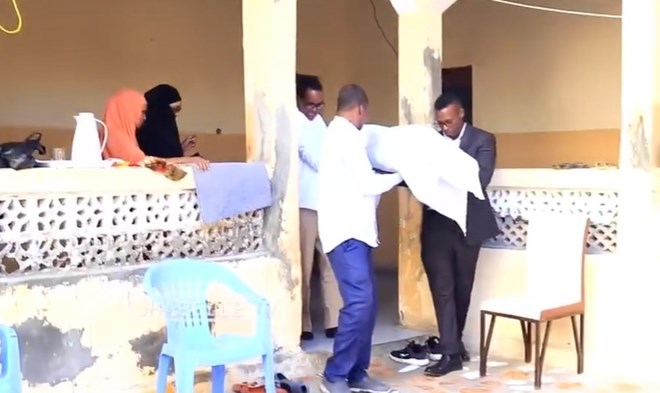
Wednesday August 27, 2025

Relatives carry a white-shrouded body after exhuming the remains of their parents from Moalim Nur cemetery on the outskirts of Mogadishu. Families say they fear the cemetery could face demolition similar to last year’s clearance of Policia (Bulusia) cemetery in the capital.
Mogadishu (HOL) — A Somali family has exhumed the remains of their parents from Moalim Nur cemetery on the outskirts of Mogadishu and reburied them in Guriel, Galgaduud region, fearing the gravesite could soon be demolished to make way for development projects.
The reburial, carried out with Islamic rites and attended by relatives and community elders, took place seven years after the couple’s initial burial. Family members described the process as painful but necessary to protect their parents’ remains from possible disturbance.
Relatives said they acted after
recalling the 2024 clearance of Policia (Bulusia) cemetery in Mogadishu, where families were forced to exhume the remains of their loved ones under a government directive that offered no clear explanation.
Bulldozers later flattened the site, which contained
the graves of prominent figures, including comedian Abdi Muriidi Dheere, widely known as Ajakis, and former Mogadishu mayor Abdirahman Omar Yarisow, who was killed in a 2019 suicide bombing. The incident sparked outrage among bereaved families and condemnation from religious leaders, who denounced the demolitions as a violation of Islamic and cultural traditions and warned that the government’s handling of cemeteries risked eroding public trust.
Community members warn that cemeteries across Mogadishu are increasingly threatened by rapid urban expansion, land disputes, and weak legal protections. Rights groups say families live in constant fear that graves could be disturbed without notice, deepening mistrust of authorities.
Civil society organizations have urged the Somali government to establish stronger safeguards for burial grounds, warning that repeated grave removals risk compounding the trauma of grieving families and undermining public trust in state institutions.








